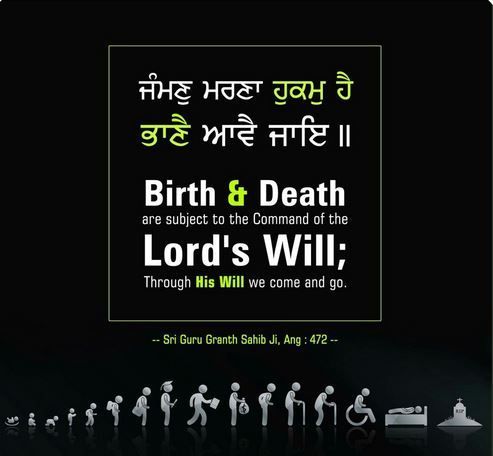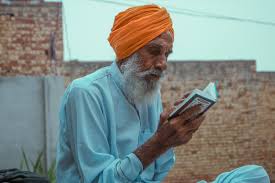Sikhism, a vibrant and inclusive faith that originated in South Asia, holds a unique perspective on the cycle of life, death, and rebirth. Central to Sikh teachings is the concept of reincarnation, where the soul, known as “atma,” undergoes a continuous journey of rebirth until it achieves liberation.
Understanding the Atma and the Cycle of Reincarnation:
Sikhism teaches that the atma, a divine spark bestowed by Waheguru (Supreme Being), resides in all beings, including humans and animals. At the time of death, the atma transitions into a new body based on the accumulated karma from its previous existence. The cycle of reincarnation, repeats until the atma attains liberation and reunites with Waheguru.

Karma and Its Impact:
Central to Sikh beliefs is the idea of karma, the consequences of one’s actions and words. Positive and moral deeds lead to good karma, while negative actions result in bad karma. The karmic balance from a previous life influences the circumstances of the atma’s rebirth. Humans, considered the highest beings in this cycle, have the opportunity to progress towards liberation by accumulating good karma through righteous living and devotion to Waheguru.
The Role of Humans in the Reincarnation Process:
Sikhs emphasize that human life is a precious opportunity to evolve spiritually. By performing selfless service, practicing daily meditations, and following the principles of Kirat Karna (earning an honest living), Wand Shakna (sharing with others), and Nam Japna (remembering the divine name), individuals can shape their future lives positively. Sikhs reject the notion of a predetermined fate, highlighting the significance of individual choices and actions.

Liberation and Spiritual Enlightenment:
Sikhism rejects the idea of an afterlife in terms of heaven or hell. Instead, the focus is on achieving higher states of consciousness through enlightenment. The atma can break free from the cycle of reincarnation by overcoming ego, meditating on Waheguru, and living a life aligned with Sikh principles. Liberation, known as mukti, occurs when the soul reaches Sachkhand, the realm of truth, and exists eternally as radiant light.
Sikhs believe in the transformative power of reincarnation, emphasizing the continuous journey of the atma towards spiritual liberation. The principles of karma, selfless service, and devotion play pivotal roles in shaping the destiny of the atma. Through understanding and embracing Sikh teachings, individuals can navigate the cycle of reincarnation with the ultimate goal of realizing oneness with the Supreme Being, Waheguru.
Human life is considered an opportunity for the atma to progress on its journey towards liberation. The emphasis is on experiencing the divine presence within and cultivating virtues such as humility, compassion, and selflessness.
The Role of Meditation in Reincarnation:
Sikhs engage in meditation, known as Simran, as a means to connect with Waheguru and navigate the cycle of reincarnation. Simran involves the repetition of the divine name, fostering a continuous awareness of the divine within. By practicing Simran, individuals aim to transcend the limitations of the ego and attain a state of thoughtlessness, aligning themselves with the divine flow.
Sikh Funeral Rites and Equality:
Sikh funeral practices reflect the belief in the equality of all souls before Waheguru. Unlike elaborate funeral rituals, Sikh funerals are simple and devoid of social class distinctions. The focus is on the departed soul’s journey, acknowledging that every individual, regardless of social status, undergoes the cycle of reincarnation based on their karma.
Clarifying Misconceptions:
While Sikhs believe in the cycle of reincarnation, it is essential to dispel common misconceptions. Sikhism rejects the notion of reincarnation after death, emphasizing the cyclical nature of life experiences while alive. The path to liberation involves living a truthful, virtuous life and realizing the divine potential within oneself.
Sikhism’s perspective on reincarnation provides a profound framework for understanding the purpose of life, the role of karma, and the pursuit of spiritual enlightenment. By embracing Sikh teachings, individuals can navigate the cycle of reincarnation with mindfulness, humility, and a commitment to selfless service. The journey towards liberation is seen as a transformative process, allowing the atma to merge with the divine and experience eternal bliss in Sachkhand.

In the realm of Sikhism, the concept of reincarnation serves as a guiding principle, urging followers to live authentically and with a conscious awareness of their spiritual journey. The continuous cycle of life, death, and rebirth is seen as an opportunity for soulful evolution, ultimately leading to the attainment of oneness with Waheguru.
What do Sikhs believe will happen after death?
Sikhs believe in the concept of the soul’s journey after death, guided by the principles of karma and divine justice. After death, the soul, known as “atma” in Sikhism, undergoes a process of rebirth, with the next life determined by the accumulated karma from previous actions.
- Reincarnation (Cycle of Samsara): Sikhs believe in the cycle of reincarnation, known as “Samsara.” The atma transmigrates into a new body based on the quality of its actions (karma) in the previous life. The cycle continues until the soul achieves liberation.
- No Fixed Afterlife Realm: Unlike some other religious traditions, Sikhs do not envision fixed afterlife realms like heaven or hell. Instead, the nature of the next life is shaped by the individual’s deeds and spiritual progress.
- Focus on Spiritual Progress: Sikhs strive to live virtuously and follow the teachings of the Gurus to accumulate positive karma. Positive actions, meditation, and selfless service contribute to spiritual progress, allowing the soul to move closer to liberation.
- Grace and Devotion: Sikhs emphasize the importance of divine grace and devotion in achieving liberation. By remembering and meditating on the divine, individuals seek to purify their consciousness and unite with Waheguru.
- Suffering for Negative Deeds: While positive actions lead to a higher rebirth, negative deeds can result in a lower life form or increased challenges. The ultimate goal is to break free from the cycle of reincarnation and attain union with the divine.
- Equality in Afterlife: Sikhism teaches that all souls are equal before Waheguru, regardless of social status or worldly achievements. The journey after death is a reflection of one’s deeds and spiritual state, emphasizing the equality of all souls.
Do Sikhs believe in moksha?
Yes, Sikhs believe in the concept of liberation, which is akin to Moksha in other Indian spiritual traditions. In Sikhism, liberation is referred to as “Mukti” or “Jivan Mukti.” The ultimate aim is to attain union with the divine, breaking free from the cycle of reincarnation (Sansara), and experiencing spiritual liberation.
Key points about Sikh beliefs regarding Mukti:
- Union with Waheguru: The primary goal is to achieve union with Waheguru, the Supreme Being. This union is considered the highest state of spiritual realization.
- Freedom from Cycle of Reincarnation: Mukti involves breaking the cycle of birth and death (Samsara) and attaining a state of eternal bliss and oneness with the divine.
- Attainment During Lifetime: Sikhism emphasizes the possibility of achieving liberation while still alive (Jivan Mukti). It is not necessarily a state reserved only for after death but can be realized through spiritual awakening and divine realization during one’s earthly existence.
- Through Divine Grace: Sikhs believe that Mukti is not solely dependent on personal efforts but also requires the grace of Waheguru. Devotion, meditation, and righteous living are seen as pathways to receiving divine grace.
- Transcending Ego: Liberation involves transcending the ego (Haumai) and realizing the true nature of the self as part of the divine cosmic order.
- Living in Harmony with Hukam: Sikhs strive to live in accordance with the divine order (Hukam) and follow the teachings of the Gurus to progress on the path toward liberation.
- Freedom from Attachments: Mukti is associated with freedom from worldly attachments, desires, and the illusion of separateness. It is a state of spiritual purity and oneness with the divine.
In Sikhism, the rituals after death are relatively simple and focused on honoring the departed soul. Sikh funeral ceremonies emphasize equality, simplicity, and spiritual remembrance. Here are key aspects of Sikh funeral rituals:
- Antam Sanskar (Last Rites):
- Washing the Body: The body is washed and dressed in clean clothing.
- Kirtan (Devotional Singing): As the body is prepared, hymns and prayers from the Guru Granth Sahib (Sikh holy scripture) are recited.
- Ardas (Prayer): An Ardas is performed, seeking divine blessings for the departed soul.
- Cremation:
- Sikhs predominantly practice cremation. The body is taken to the cremation ground, and the cremation is usually done as soon as possible after death.
- The ashes are not preserved but are disposed of respectfully, often in flowing water.
- Kirtan and Path:
- After the cremation, a continuous reading of the Guru Granth Sahib is conducted for ten days in memory of the departed soul.
- Devotional singing (Kirtan) may also take place during this period.
- Bhog Ceremony:
- The conclusion of the reading of the Guru Granth Sahib is marked by a ceremony called “Bhog.” It involves the completion of prayers and hymns.
- Langar (community meal) is often served to those in attendance.
- Prayer Meetings:
- Friends and family may gather for prayer meetings or gatherings, where hymns and prayers are recited in remembrance of the deceased.
- No Mourning Restrictions:
- Sikhism discourages elaborate mourning rituals and practices. Family and friends are encouraged to accept the will of Waheguru (God) with grace.
- Sikhs believe that the departed soul continues its journey based on its deeds, and excessive mourning is discouraged.
- Gurdwara Service:
- Families may choose to have a service at the Gurdwara (Sikh place of worship) for additional prayers and remembrance.
- Sarbloh Granth Reading (Optional):
- In some Sikh traditions, a reading from the Sarbloh Granth (a secondary scripture) may be conducted.
It’s important to note that Sikh funeral practices emphasize the equality of all individuals in death, irrespective of their social or economic status.







